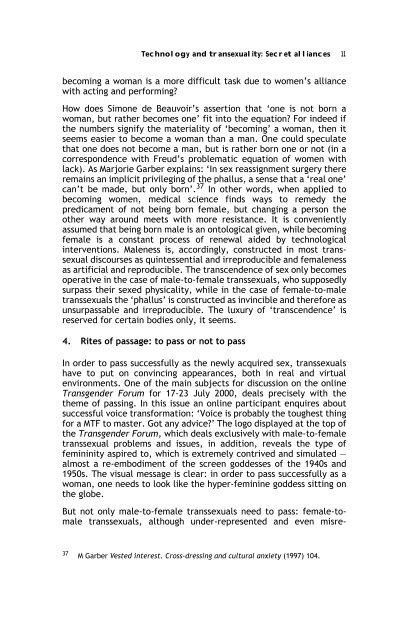Sex, Gender, Becoming - PULP
Sex, Gender, Becoming - PULP
Sex, Gender, Becoming - PULP
You also want an ePaper? Increase the reach of your titles
YUMPU automatically turns print PDFs into web optimized ePapers that Google loves.
Technology and transexuality: Secret alliances 11<br />
becoming a woman is a more difficult task due to women’s alliance<br />
with acting and performing?<br />
How does Simone de Beauvoir’s assertion that ‘one is not born a<br />
woman, but rather becomes one’ fit into the equation? For indeed if<br />
the numbers signify the materiality of ‘becoming’ a woman, then it<br />
seems easier to become a woman than a man. One could speculate<br />
that one does not become a man, but is rather born one or not (in a<br />
correspondence with Freud’s problematic equation of women with<br />
lack). As Marjorie Garber explains: ‘In sex reassignment surgery there<br />
remains an implicit privileging of the phallus, a sense that a ‘real one’<br />
can’t be made, but only born’. 37 In other words, when applied to<br />
becoming women, medical science finds ways to remedy the<br />
predicament of not being born female, but changing a person the<br />
other way around meets with more resistance. It is conveniently<br />
assumed that being born male is an ontological given, while becoming<br />
female is a constant process of renewal aided by technological<br />
interventions. Maleness is, accordingly, constructed in most transsexual<br />
discourses as quintessential and irreproducible and femaleness<br />
as artificial and reproducible. The transcendence of sex only becomes<br />
operative in the case of male-to-female transsexuals, who supposedly<br />
surpass their sexed physicality, while in the case of female-to-male<br />
transsexuals the ‘phallus’ is constructed as invincible and therefore as<br />
unsurpassable and irreproducible. The luxury of ‘transcendence’ is<br />
reserved for certain bodies only, it seems.<br />
4. Rites of passage: to pass or not to pass<br />
In order to pass successfully as the newly acquired sex, transsexuals<br />
have to put on convincing appearances, both in real and virtual<br />
environments. One of the main subjects for discussion on the online<br />
Transgender Forum for 17-23 July 2000, deals precisely with the<br />
theme of passing. In this issue an online participant enquires about<br />
successful voice transformation: ‘Voice is probably the toughest thing<br />
for a MTF to master. Got any advice?’ The logo displayed at the top of<br />
the Transgender Forum, which deals exclusively with male-to-female<br />
transsexual problems and issues, in addition, reveals the type of<br />
femininity aspired to, which is extremely contrived and simulated —<br />
almost a re-embodiment of the screen goddesses of the 1940s and<br />
1950s. The visual message is clear: in order to pass successfully as a<br />
woman, one needs to look like the hyper-feminine goddess sitting on<br />
the globe.<br />
But not only male-to-female transsexuals need to pass: female-tomale<br />
transsexuals, although under-represented and even misre-<br />
37 M Garber Vested interest. Cross-dressing and cultural anxiety (1997) 104.
















